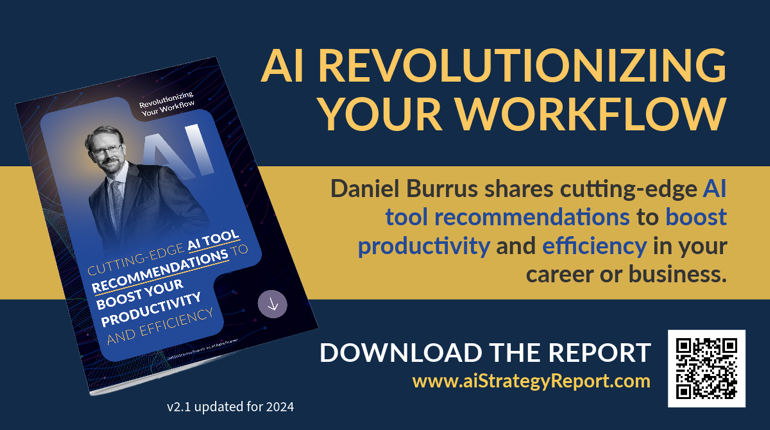Comments
- No comments found

There is so much talk about generative AI today, it has become somewhat of a hot-button issue among working professionals and business leaders.
We are witnessing firsthand the power of generative AI with applications like ChatGPT, Gemini, and other content-creating software. On Meta, Instagram, and other social media sites, there are works of digital art being created by generative AI applications like Midjourney, Canva and DALL·E 3 to name a few.
But despite the fact that many are already implementing it while others are kept up at night about it, even I have to beg the question: So what?

Why does the Hard Trend future certainty of generative AI matter so much to society, both professionally and personally? Is there real danger I should be aware of regarding this disruptive digital application? How can it make my life better at work or at home?
Again, generative AI is here to stay. So what?
What we saw happen in 2023 and years prior was an exponential growth of generative AI by way of content creation applications. Last year, the average person went from a very rough understanding of “artificial intelligence” itself to worrying that AI will replace them in their job, put them out of business, or help their child cheat in school.
But as I mentioned above, AI itself and more specifically generative AI is not going to slow down — it is only going to accelerate! And as a result, we are going to see massive change in all industries and career fields.
Let’s take the teaching and education sector and generative AI’s impact on it. If you survey any number of teachers or administrators right now, you may find that for the most part, they fear generative AI. This fear pertains to cheating on assignments and tests, and their belief that students will be worse off as a result.
Yet because our first reaction is fear, we tend to hold ourselves back from seeing the benefits and, thus, prevent an Anticipatory Mindset from replacing an agile one. If we accept that generative AI is a Hard Trend future certainty, we will be able to see it as nothing more threatening than a calculator was to longhand math!
Generative AI should not be banned from the classroom. Without question, it should be leveraged for good!
One of the most prolific developments in generative AI and the education sector is the ability for a more personalized education experience for every student. How is this possible? Well, think of all the data any given individual puts into the digital world.
There have been breakthroughs in specialized generative algorithms that are being powered by big data. If you consider all of the personalized data of every individual, think of how that can be leveraged for educational purposes. These can be advancements including AI applications that help students comprehend the class textbook to something that can rephrase questions on a quiz so that a student with a learning disability succeeds in their own way.
What this results in is teachers being able to focus on personalizing the experience in the classroom even further, focusing instead on the higher cognitive domain of each student. I relate this concept back to the invention of the calculator and in more recent years, the computer and now tablet. The calculator helped us do basic addition faster and in turn, teachers focused on making sure students could visualize what it was doing. The computer let us write papers with ease so teachers could focus more on their students learning the importance of the material they are writing about.

Now, generative AI will help with personalizing educational experiences to each individual learner. This is the perfect opportunity for teachers to then be able to personalize their interaction with each student much easier, making every learner feel welcome and find success in learning.
Staying on the topic of education, even though generative AI is here and you may say to yourself, “So what? What is the big deal?” — it is imperative that you anticipate what is to come with it.
So many find themselves having to adapt, which is what breeds the fear of change. We feel out of control when change happens to us. But the concept of change is the only constant in every industry; the question is whether you will take charge and be the force of transformation on your own.
Adaptation is not what we should be doing. We should be taking this moment to anticipate what is coming our way regarding developments in generative AI. How do we anticipate the future of generative AI right now? Look at what is already there as a Hard Trend future certainty and think, “If this type of generative AI is already capable of doing certain tasks, it no doubt will be able to do more.”

Likewise, especially in education, think critically! Think exponentially. What are some basic tasks that are filling the days in your classroom and exhausting you? What would make reaching students easier? What would make students’ lives easier?
Generative AI is and will continue to simplify our lives, but that does not mean we have to grow complacent. Mastering generative AI allows you to better lead a business, teach a classroom, and be human in it all.
Eager to master generative AI and stay ahead of the curve? Get your hands on Daniel Burrus' AI Tools and Recommendations Report. Visit www.aiStrategyReport.com now and step into the future prepared and informed. Download today and transform anticipation into action!
Daniel Burrus is considered one of the world’s leading futurists on global trends and innovation. The New York Times has referred to him as one of the top three business gurus in the highest demand as a speaker. He is a strategic advisor to executives from Fortune 500 companies, helping them to accelerate innovation and results by develop game-changing strategies based on his proven methodologies for capitalizing on technology innovations and their future impact. His client list includes companies such as Microsoft, GE, American Express, Google, Deloitte, Procter & Gamble, Honda, and IBM. He is the author of seven books, including The New York Times and Wall Street Journal best-seller Flash Foresight, and his latest book The Anticipatory Organization. He is a featured writer with millions of monthly readers on the topics of innovation, change and the future and has appeared in Harvard Business Review, Wired, CNBC, and Huffington Post to name a few. He has been the featured subject of several PBS television specials and has appeared on programs such as CNN, Fox Business, and Bloomberg, and is quoted in a variety of publications, including The Wall Street Journal, Financial Times, Fortune, and Forbes. He has founded six businesses, four of which were national leaders in the United States in the first year. He is the CEO of Burrus Research, a research and consulting firm that monitors global advancements in technology driven trends to help clients profit from technological, social and business forces that are converging to create enormous, untapped opportunities. In 1983 he became the first and only futurist to accurately identify the twenty technologies that would become the driving force of business and economic change for decades to come. He also linked exponential computing advances to economic value creation. His specialties are technology-driven trends, strategic innovation, strategic advising and planning, business keynote presentations.
Leave your comments
Post comment as a guest